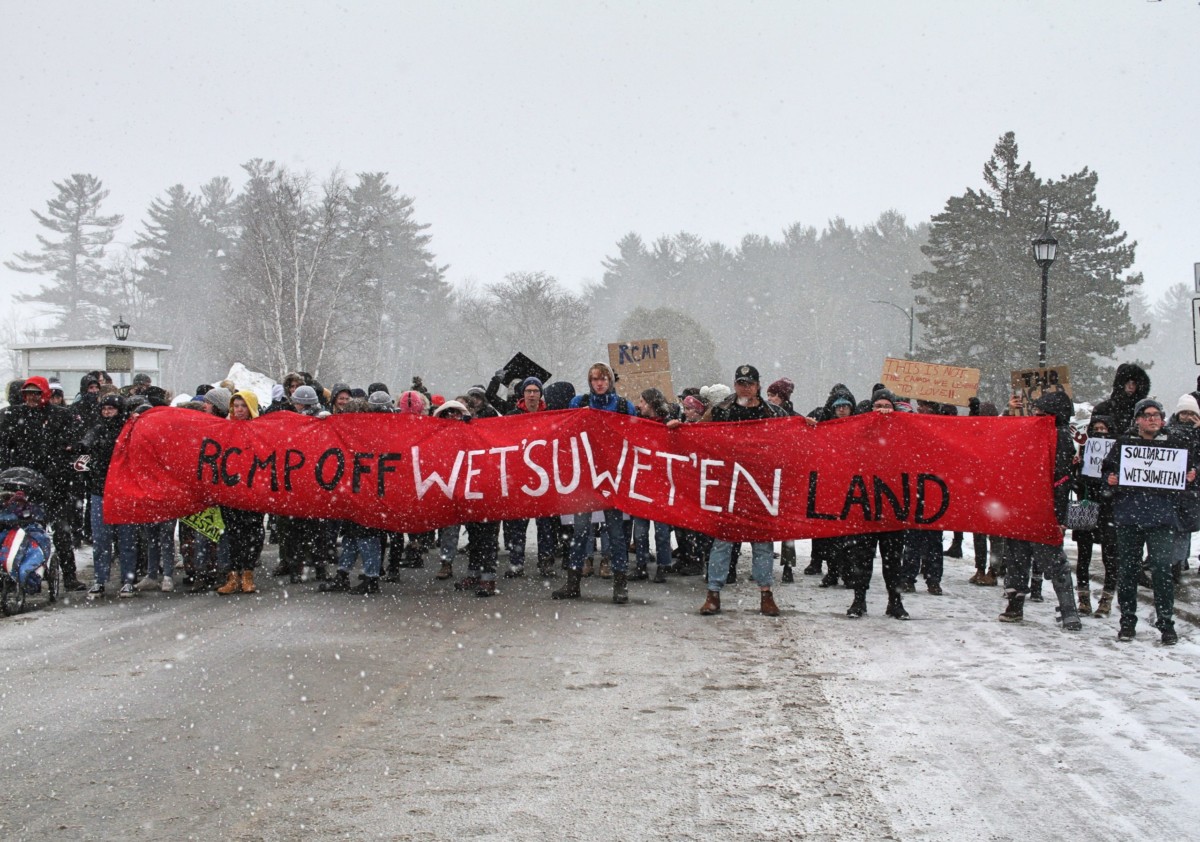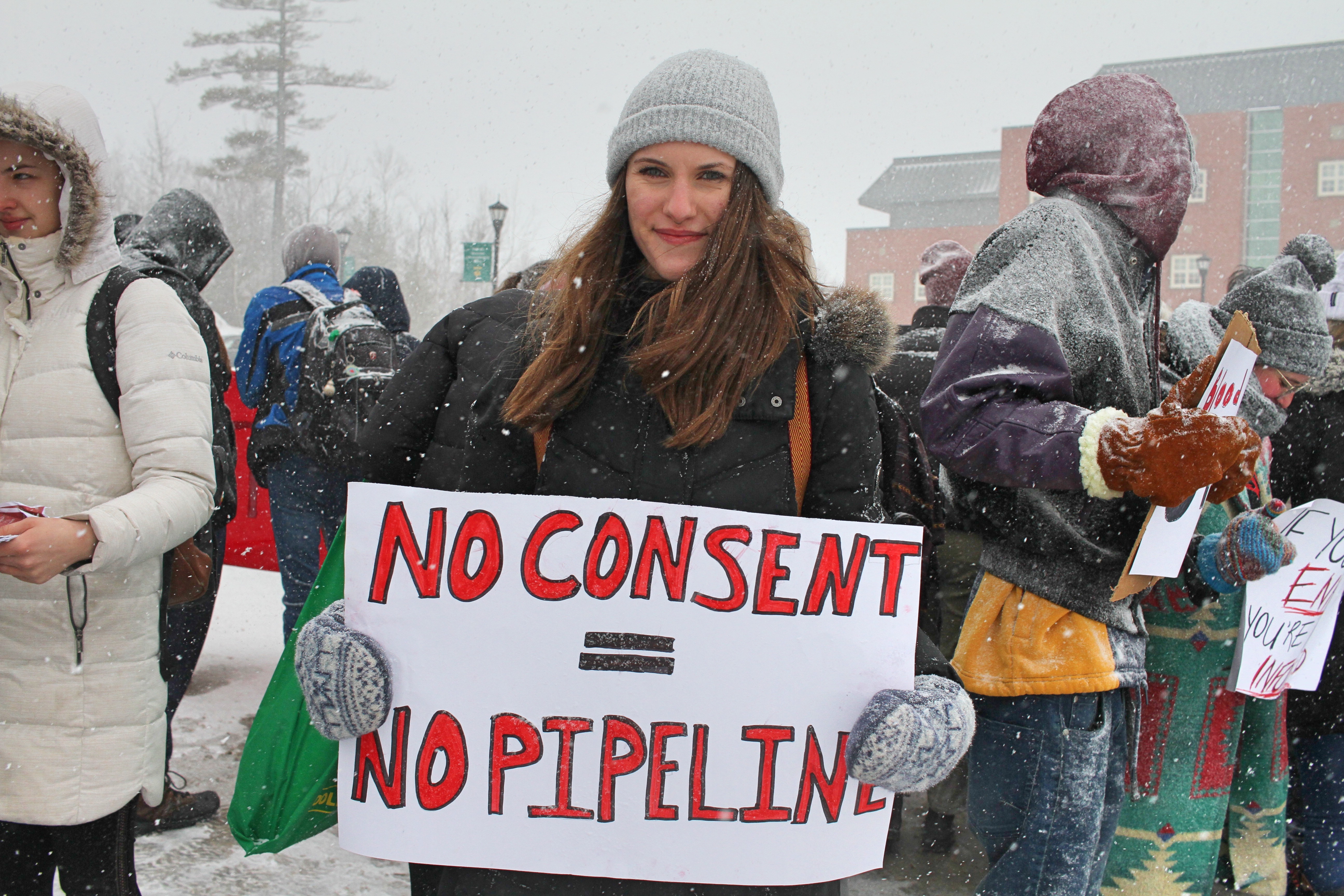
Students gathered in the St. Thomas University courtyard during a winter storm on Feb. 27 for a rally supporting the Wet’suwet’en nation. It followed the delivery of a letter to STU President Dawn Russell’s office requesting the university release a public statement of solidarity.
STU students Naomi Gullison, Aaron Beaumont and Hannah Moore organized the rally.
“In order to stand in solidarity, the university needs to assess what they’re doing as an institution,” said Moore.
Moore is referring to STU’s investments in TC Energy, which runs and operates the Coastal GasLink project that is proposed to go through Wet’suwet’en territory.
“They would need to withdraw from those [TC Energy] investments before they can truly stand in solidarity with Indigenous Peoples in Canada,” said Moore.

The rally proceeded to Duffie Drive where traffic was blocked for about 20 minutes. Approximately 70 students and community members attended the rally.
Jeffrey Carleton, vice-president communications at STU, said STU will not be releasing a statement. Carleton said he does not know of a time where STU has issued a statement on a political issue “that wasn’t directly related to our mission of education, or post-secondary education.”
“We’re not in the practice of taking formal public statements on ongoing political issues because we’re an education institution, we’re not a social justice or a political action group,” he said.
A similar situation in N.B.
Ron Tremblay, the grand chief of the Wolastoq grand council, said it’s important to stand with the Wet’suwet’en nation because of the proposed construction of the Sisson Mine near the community of Napadogan.
The Sisson Mine was approved by the provincial government in 2015. Since its approval there has been opposition by Indigenous communities. Wolastoq grandmothers and other community members have been living near where the construction is supposed to begin to protest it being built.
“We’re standing against that mine,” said Tremblay.
The Sisson Mine was approved federally in July.

Tremblay was glad to see students coming together to support Wet’suwet’en.
“The students are finally realizing the importance of saving the earth, the water and the air for their future, because it’s going to be their future and the future of their children and their grandchildren that will be deeply affected,” he said.
Tremblay hopes STU stops investing in fossil fuels and invests in more renewable energy sources.
The investments
Carleton said the total value of the STU endowment is approximately $23 million. Endowments are funds typically made up of donations or assets. Of that, they invest $1.5 million in the energy or utility sector and $77,000 of the $1.5 million is invested in TC Energy.
The Board of Governors, a committee made up of ex officio members, faculty representation, student representation, alumni representation, appointed members and observers, are responsible for managing the investments, said Carleton. They are the highest governing body of St. Thomas University. They do so thorough an investment committee who are responsible for working with their investment corporation, CIBC Wood Gundy which is CIBC’s investment banking operations, to manage their endowment.

Moore first sent a letter to Russell’s office in late January requesting the university divest from their fossil fuel investments. When Russell received the request, Carleton said it was passed on to the investment committee.
Moore will meet with the committee on April 3. She will ask them to withdraw from their investments in fossil fuels by implementing changes to their investment policy, “which include consideration and regulation regarding the environment and social impacts,” she said.

Carleton said after, the committee will make a recommendation to the board on what to do next.
But he said the committee is also currently reviewing their investment policy statement, which include the guidelines they give to the investment corporation to manage their endowment.
The policy has a section on what approaches STU should take towards “concepts relating to the environment, social justice and corporate governance,” said Carleton.
Carleton said he wouldn’t be surprised if they try to do both at once, meaning the committee would deal with the specific request of divestment from Moore while they’re looking at the “investment processes and investment philosophy.” Regardless, Carleton said they have a board meeting early May and should have a better idea what will happen then.
“There may not be an answer in the May meeting simply because they have other issues they are dealing with relating to the investment policy statement. And they may say, ‘We don’t want to make a decision on this without an updated policy statement.’”
Student hopes no one forgets
On Feb. 10, STU student Aaron Beaumont organized a sit-in demonstration on the steps outside of George Martin Hall. They said they wanted to plan something bigger, which is why they helped organize the most recent rally.
“And I think that doing something on campus is really important, especially where STU is directly investing in this pipeline. I think that as students, we have a responsibility to speak out about that,” they said.

Beaumont said it’s important to also stand in solidarity with Wet’suwet’en because the situation in British Columbia is “not getting any better.”
“People are being ripped off their lands all across the country, and I just think there’s no way that we can’t do anything. We can’t just sit here and watch it happen.”
Beaumont said it’s important for students to stand with Wet’suwet’en because “we’re all here to get an education.”

“And a lot of us, I think, are learning about how to go out into the world and make a difference, and that doesn’t have to wait until our degree is over,” they said.
Beaumont said they hope people don’t forget what’s happening in Wet’suwet’en now that the rally is over.
“I think we need to keep our eyes on what’s happening and do our best to keep the government, the police accountable, even keep faculty and the president at STU accountable.”
